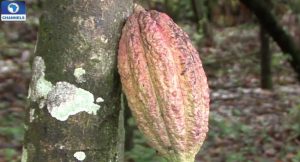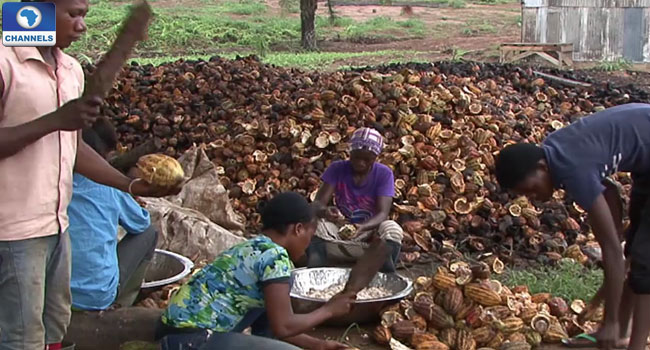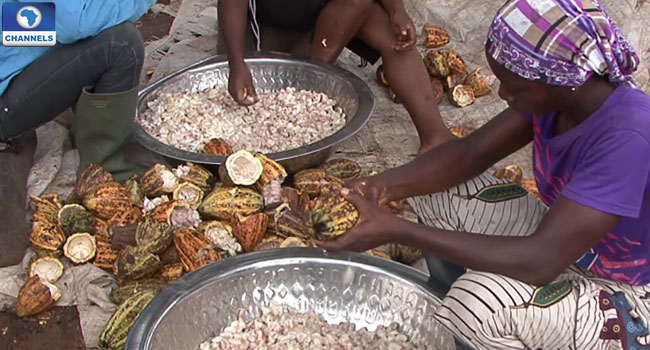
This forms part of the consensus at the end of a three-day regional symposium for participants in Central and West African countries which took place at the International Institute for Tropical Agriculture (IITA) in Nigeria’s southwest town of Ibadan.
Participants from over 15 countries joined cocoa stakeholders from all cocoa producing states in Nigeria to fashion out ways of achieving more growers, refined seedlings, better yields and improved value chain. These were identified as variables that must be fine tuned to see relative growth in cocoa production.
Participants also sought replacement of ageing population of both the trees and the farmers in order to meet and sustain the current global standard in cocoa production and its value chain.
The summit concluded that Africa, representing about 70% of global cocoa production, must work really hard to ensure that its cocoa remains competitive alongside other cash crops with better propagation technologies and improved varieties that are resilient against today’s threats.
Experts at the International Conference Centre of the IITA expressed worries that the consumption of cocoa has risen dramatically and significantly globally.
Research outcomes indicate that there will be more demand as consumption of cocoa increases as a result of confirmed health benefits.
In her welcome address, Molecular Geneticist for IITA Dr. Ranjana Bhattacharjee, noted that “there are several challenges surrounding cocoa sector in this region which entails the entire value chain, scientific innovations and partnerships are fighting to tackle this challenges”.

“Together each one of us have the expertise and a key role to play to transform the cocoa sector in the region and make it sustainable. This symposium is happening at the right time when the dynamics in most of the West and Central Africa countries are changing and cocoa has the ability to contribute to the development of all the country producing it.
“Let’s collectively think of how to connect the missing links and make the symposium successful,” she told the gathering.
The Director General of the Cocoa Research Institute of Nigeria, Professor Olayiwola Olamakinwa, in his address said the symposium was jointly organised by the World Cocoa Foundation, International Institute of Tropical Agriculture, Cocoa Research Institute of Nigeria and Africa Cocoa Breeders Group.
“It is our joy to witness this gathering of global community for this symposium in our sub-region and it is our hope that crucial issues affecting the cocoa economy will be addressed in this meeting,” he said.
African cocoa farmers are getting older, so are the trees and the youth are not motivated enough to replace the weak generation of farmers, this is why the summit agreed that there was urgent need to close ranks and evolve with strategies of bringing in youth to the farms.
To achieve the much needed increased production, the farms must be rehabilitated, varieties must be improved to aid higher productivity, shorter generation interval and greater yield per hectare and resistant to diseases must be made available to close the deficiency gap.
Professor Olamakinwa told the gathering that “cocoa has attained an enormous importance in the world with recent scientific proofs of the health benefits globally”.
Wide Margin Value Addition
Leading traditional monarch in Yoruba land, the Ooni of Ife, Oba Adeyeye Enitan Ogunwusi , Ojaja the second, is one of the most active vanguards of cocoa revival in western Nigeria.
According to him, about two million seedlings have been recently propagated in Ile Ife through one of his initiatives to engage the unemployed youth in agriculture.
“Look at it. They will buy cocoa for assuming $2,000 after buying for $2,000 they will use that value to get more than $30 000. You can see that wide margin value addition.
“That is the campaign we want to try and cultivate so that our youth will be encouraged to go back into farming because farming now, youth don’t want to go back into it because of the price disparity. So, it is a good start. First of all, it is our unity that is key in which we are trying to do and to the glory of God, God is really helping us.
“Unity is key in the sense that if we have excess, we can go to another kingdom and bring youth there. We can go there and do what we call reciprocity programmes. We go there and work with them but if we are one in unity there is a lot of strength there. So, that is what we are doing now,” the Ooni stated.

The Ooni further observed that “cocoa is a blessing from our creator and it naturally grows and flourishes naturally out of tropical Africa.
“In terms of research, in terms of enhancing that production, we should bring our comparative advantages to the table and see how we can have a good yield of cocoa plantation. An annual growth on the average over the last decades has been six to 10% on annual basis and it will keep growing, what are we doing to help ourselves”.
The Deputy Director General, IITA Dr. Kenton Dashiell, noted that IITA had some critical functions in the conduct of research that would increase the production of cocoa throughout Nigeria, West and Central Africa.
The forum looked at the production of high quality planting materials with the newest genotypes that are available in cocoa which they stressed must be accelerated.
Improved cropping systems that can increase the yields and quality of cocoa with disease control techniques capable of improving soil fertility must also be made accessible and affordable by all, Dr. Dashiell stressed.
“We have two major roles one of them is to conduct research that will increase the production of cocoa throughout Nigeria, West and Central Africa.
“Mainly two prong approaches to greatly accelerate the production of high quality planting materials with the newest genotypes that are available in cocoa. The next one is the improved cropping systems that can increase the yields of cocoa and the quality of cocoa. It mainly have to do with technique with disease control and improving soil fertility so that the cocoa pods will not be abandoned,” he pointed out.
The cocoa breeders present also believe the summit will broaden partnerships to drive policy formulations in the interest of cocoa production.
The Chairman of the African Cocoa Breeders Group, Dr. Hannah Muyiwa, in her address said “this symposium presents us with a lot of opportunities to further multifaceted alliances, identifying research gaps that will allow cocoa attain its optimal potential across the region.
“We, therefore, welcome engagements and partnerships from other stakeholders, institutions, government and policy makers, for support and investment that will expand the horizon of cocoa research and finally stabilise the cocoa sector in the region,” he stated.
In his submission, the representative of World Cocoa Alliance, Mr Paul Macek, told the gathering that “cocoa today faces more threat than ever from pests, diseases and now sadly climate change”.
He said: “We must work to ensure that our region’s cocoa remains competitive alongside other cash crops which are coffee, rubber, oil palm. And to do this, we need better propagation technologies and improved varieties capable of withstanding todays threat and tomorrow’s threat. While also yielding the flavour in organoleptic attribute that the world turns to African cocoa to satisfy,”
he added.
“Obviously Nigeria remains one of the four very important countries in West Africa including Cote D’Ivoire, Ghana, Cameroun and together those four countries make up over 70% of the world’s production. So, I will argue that the Nigerian cocoa is very important patrimony for this country as well as important producer for the world global market.
“I think cocoa is a leading star for Africa. It employs an estimated two million people in West Africa and obviously behind those people are many large families. So, there are millions of people on the rural economy who depends on cocoa as their primary source of livelihood and we have to figure out ways to support them in their cocoa production,” he told the participants.
As these efforts begin in more than eight countries across West and Central Africa, critics have stressed that the Nigerian government must play a leading role of providing necessary templates for cocoa rebirth and appreciation beyond rhetoric and weak political will.
The new efforts must yield something much greater than Cocoa House in Ibadan which was built from proceeds of cocoa production in the 70s.

